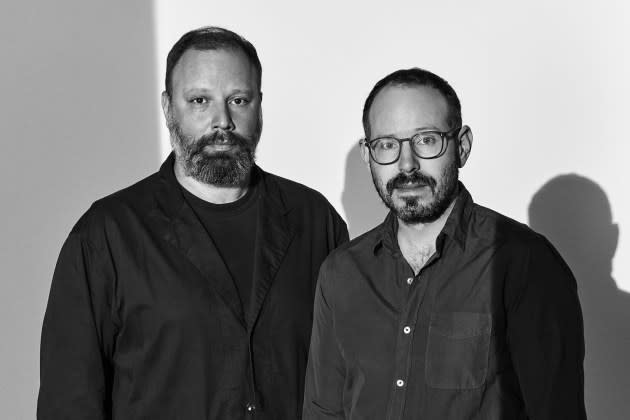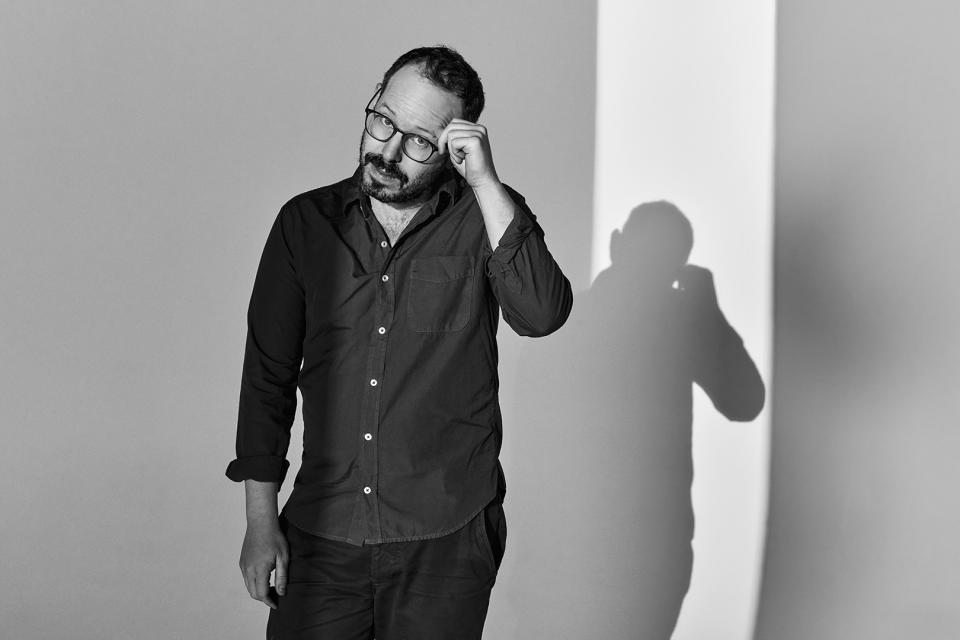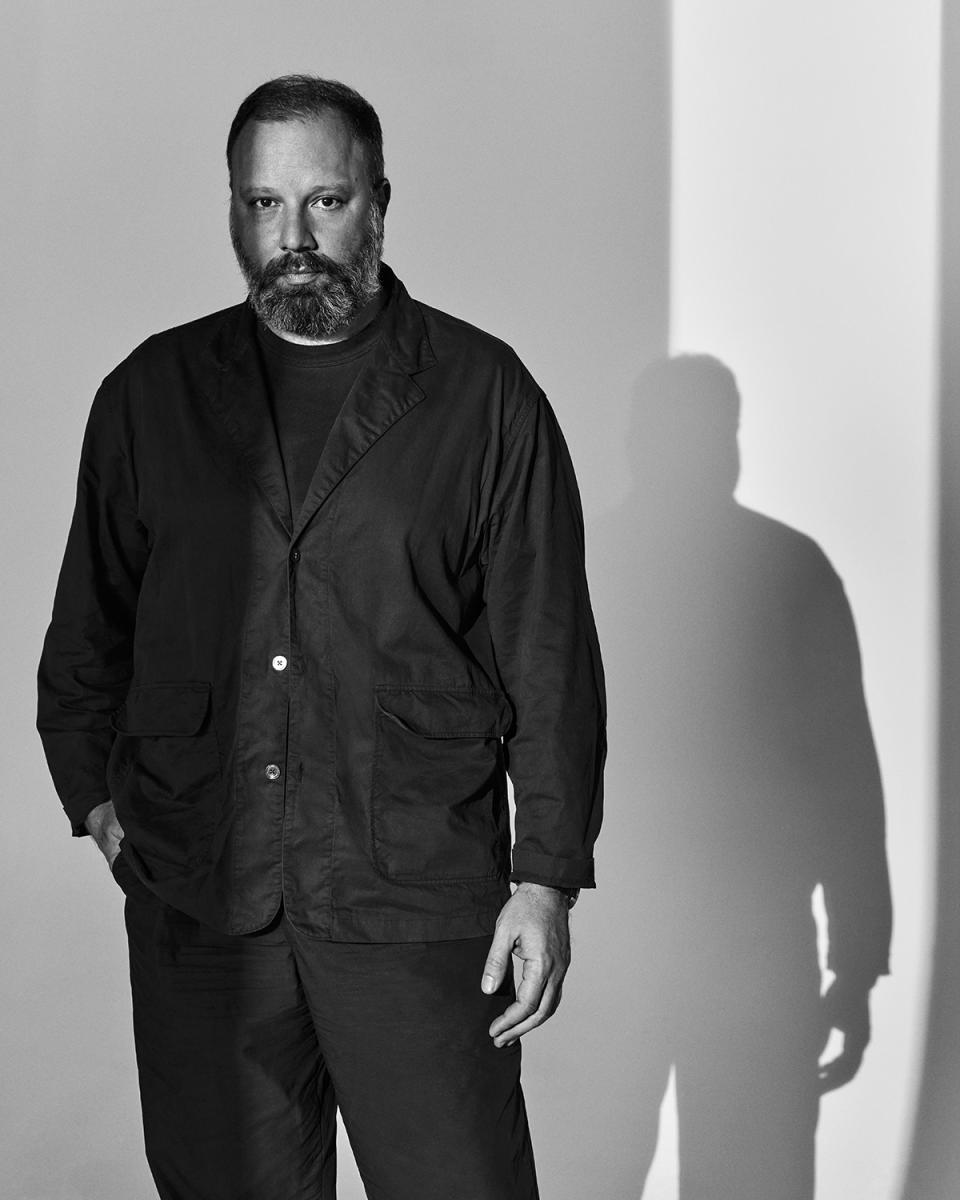Yorgos Lanthimos and Ari Aster on ‘Poor Things,’ Sex Scenes and Joaquin Phoenix’s ‘Beau Is Afraid’ Reaction: ‘Why Would I Do This?’
- Oops!Something went wrong.Please try again later.
- Oops!Something went wrong.Please try again later.
- Oops!Something went wrong.Please try again later.
- Oops!Something went wrong.Please try again later.
- Oops!Something went wrong.Please try again later.

Over their careers, “Hereditary” director Ari Aster and Yorgos Lanthimos, who helmed “The Favourite,” have each developed an unmistakable filmmaking voice. But this year, both stretched into brand-new cinematic territory. With “Beau Is Afraid,” Aster crafted a nearly three-hour fever dream chronicling the mental unraveling of its profoundly neurotic title character, played to the hilt by Joaquin Phoenix. Meanwhile, Lanthimos partnered with frequent collaborator Emma Stone for “Poor Things,” adapted from the Alasdair Gray novel about Bella Baxter, a grown woman implanted with the brain of an infant. In their first ever conversation, they discussed how they work with their leading actors and bringing a new, expansive visual palette to their movies.
ARI ASTER: I love “Poor Things.” It’s so great. How did you discover the book?
More from Variety
YORGOS LANTHIMOS: It was around 2011, I think. I was starting to make English-language films, so I was reading a lot, and I came across Alasdair Gray. I actually went up to Glasgow and met him. He was very, very generous. He took me around Glasgow, and then he sent me off and gave his blessing to make the film. And that was it. We never really spoke since. Unfortunately, he’s now dead, so he never got to see the film. But he was a very special person and artist. How long did it take for you to write “Beau Is Afraid”?
ASTER: I wrote the first draft over 10 years ago, and I think I wrote it over the course of a month. Then rewriting it in 2019, that took nine months or so.
LANTHIMOS: Why didn’t you make “Beau Is Afraid” when you first wrote it? Is it because you didn’t want to or couldn’t?
ASTER: There was a period during which I thought it would be my first film. I remember giving it to a producer that I went to school with, and she sat me down and said, “Yeah, this is nice, but do you not want to make a movie?” I realize now that I was trying to get it made for $5 million, and there’s no way I would’ve been able to do it. I want to ask you about Emma Stone. You’ve made four films together. She’s so great in this film in particular. It’s really kind of a magic trick.
LANTHIMOS: I don’t think a character like this ever existed before. We didn’t know how we were going to approach it. It read great on paper, but when you start to think, “OK, now we have to make it real,” it was scary. And it’s basically her. I mean, you can’t help an actor deal with such a complex character. You can’t show them how to do it. We have this great relationship because we can just get on with it and try things without having to discuss too much about it. We understand each other with a gesture or a look. We trust each other and we admire each other, and it just helps to feel safe. If something fails, you have the other person to protect you. Either I fail and she’s there to make it look all right, or she might have a moment which is not on point, and I can take that away. Talk to me about Joaquin Phoenix — when did you first talk to him about “Beau Is Afraid”?
ASTER: It was sort of a long courtship. I sent him the script. He wrote me back saying, “Why would I do this?”
LANTHIMOS: That’s a good question.

ASTER: So I got on the phone with him and I argued why he should do it, and then he said, “I don’t know.” It was something like 15 conversations that led to him tentatively maybe agreeing. Having now worked with him, I understand why he is so reluctant to jump onto anything — because he really puts all of himself into whatever he’s doing. The way that he challenges the material — not in a gratuitous way or in a way that’s a pain in the ass. The question usually amounts to “Is there anything we haven’t considered here?” I realized that it’s something that I was really wanting from an actor, and now I can’t imagine making a film without him. We’re going to do another film together, and I’m really excited about it.
LANTHIMOS: This time around, was he easier to agree to making it?
ASTER: Yeah. [Laughs] But still the questions are always there, and I wouldn’t have it any other way.
LANTHIMOS: We have sex scenes in the film, and the way we approach it is to use an intimacy coordinator, which to me helps a lot.
ASTER: We had one on “Beau Is Afraid.” In the end, it’s a scene you have to choreograph, and I found that the mediation that they bring was useful and takes some of the anxiety off. The set becomes much more sensitive when you’re doing those.
LANTHIMOS: I love working on very quiet sets with very few people. And when you have these intimate scenes, everybody gets that there should be the least amount of people possible. That’s very beneficial to the atmosphere on set. Emma and I always go, like, “Why don’t we film every scene like that?”
ASTER: It’s more focused. There are no extra takes. You get what you need, and then you move on. I mean, that’s what I found.
LANTHIMOS: At the same time, I think both of us made the biggest-scale films we’ve made so far. I was wondering whether you had envisioned “Beau” in that scale from the beginning, or because you were able to make that scale of a film, it became bigger?
ASTER: I didn’t have a sense of how big the film was as I was writing it. Then when we did a budget, we talked about what it needed, which was a lot more than I had anticipated. I think where it kept ballooning was I kept having new ideas like, “Oh, I want this in the background. I want this guy over here. I want to have this shop on his street.” That was the joy of making the film, creating this totally invented world. But it was also the thing that I think drove everybody crazy. The film was never finished. I was adding things up to the morning of shooting whatever scene we were on. But that really was so fun, and I want to do it again. The world in “Poor Things” is also this invented fantasyland. I mean, they go to Lisbon, but I’ve been to Lisbon, and it doesn’t look like a Cheesecake Factory.
LANTHIMOS: Yeah, well …
ASTER: That was very reductive, by the way. I’ll rephrase that. I’ve been to Lisbon, and it doesn’t look like that.

LANTHIMOS: [Laughs] I felt from the beginning that we had to build this world that reflected her way of seeing things, so it couldn’t be totally realistic. So I started thinking about old-school filmmaking, Fellini films or Powell and Pressburger and all those kind of films. We have modern technology, but [I wanted to] maintain that kind of more tactile, hand-made feeling of everything. I didn’t know exactly what it would look like, so it took a while.
ASTER: Who are some filmmakers that you grew up loving and feeling particularly inspired by and excited by?
LANTHIMOS: I didn’t really grow up with the filmmakers that I admire today. Really young, I loved Bruce Lee films. Do you remember Bud Spencer and Terence Hill, those funny Westerns? Those are the films that I grew up with. And of course, there was “Jaws” and “Rocky.” I was not an intellectual young kid. But then when I went to film school, I got to know a lot more. The funny thing is, some of my favorite filmmakers, you wouldn’t necessarily see the influence. But obviously there’s a lot more going on subconsciously: John Cassavetes, Robert Bresson — they’re so different from each other that it’s hard to imagine the combination.
ASTER: But I see Bresson in your work, absolutely.
LANTHIMOS: And of course, Buñuel or Kubrick. It’s always difficult when someone asks you, “Who are your favorite filmmakers?” Or your favorite films — even worse. But what about you? Did you have any specific films or filmmakers while you were making “Beau Is Afraid”?
ASTER: There were a lot of picaresque novels like “Candide” and “Tristram Shandy” and “Don Quixote.”
LANTHIMOS: So more literary than film.
ASTER: Yeah, but “Playtime” by Tati was an inspiration to me. Just making sure that every background actor had a thing and was a character. Sometimes you realize in the edit, what …
LANTHIMOS: … what was in your mind …
ASTER: … without you realizing it. I try to avoid self-consciously nodding towards something.
LANTHIMOS: You want to feel special, and you’re trying to make your film as original as it can be. But you can’t avoid having this history of great filmmakers.
ASTER: No. So it’s good to try to avoid because it’s going to happen anyway.
Variety Directors on Directors presented by “Saltburn.”
Best of Variety
'House of the Dragon': Every Character and What You Need to Know About the 'Game of Thrones' Prequel
25 Groundbreaking Female Directors: From Alice Guy to Chloé Zhao
Sign up for Variety’s Newsletter. For the latest news, follow us on Facebook, Twitter, and Instagram.

